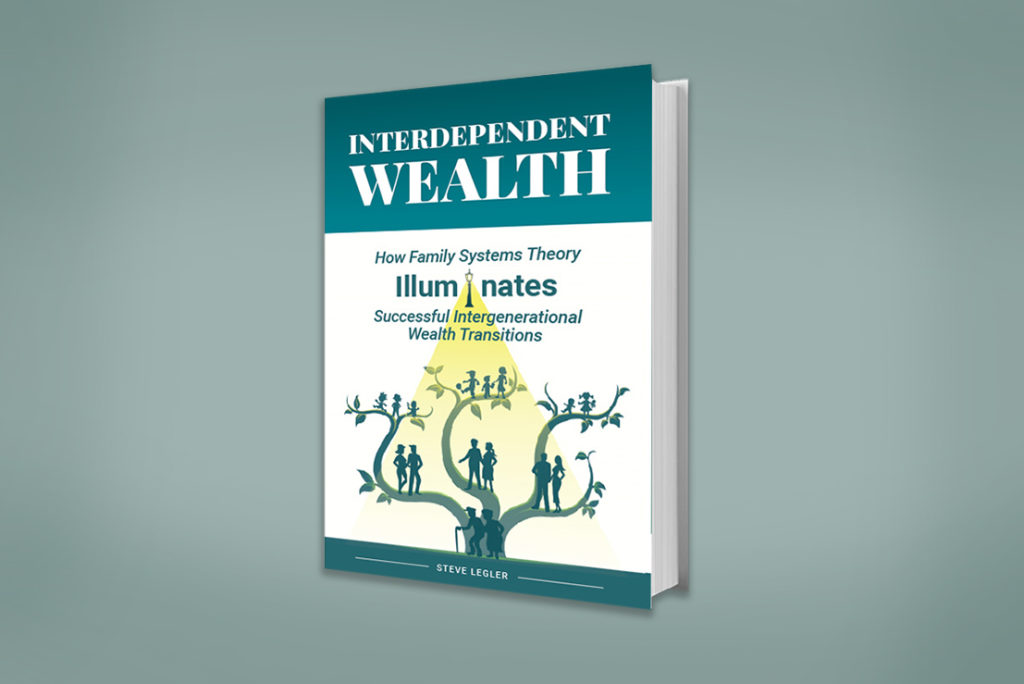Introduction:
Steve Legler, author, coach and family legacy advisor joined our Tamarind Partners’ podcast, “Family Office Focus,” hosted by Kirby Rosplock, PhD, to discuss his new book, Interdependent Wealth: How Family Systems Theory Illuminates Successful Intergenerational Wealth Transitions. His book discusses how communication breakdown within the family, lack of preparation, and poor family dynamics prevent more families from passing on wealth and business interests than that of any business-related issues within their operating companies. Legler’s book helps practitioners and tacticians address complex family systems and family dynamics that often stifle their wealth transfer and business succession plan follow-through.
Murray Bowen, who was a psychiatrist and professor at Georgetown University, was the first and only psychiatrist to describe a theory explaining human behavior. Bowen Family Systems Theory views the family as an emotional unit and uses systems thinking to describe the complex interactions of the family. Family members are affected by other member’s thoughts, feelings, and actions. This connectedness and reactivity create interdependence between the family members. On this podcast, Kirby talks with Steve about the important role that Bowen Family Systems Theory plays in understanding and unraveling complex family relationships, specifically as it relates to the successful transition of intergenerational family wealth.
Podcast:
Kirby: Why was it important to write a book on Murray Bowen’s Theory?
Steve: Problems that arise in family businesses are rarely only business-related. Conversely, the biggest issues that families struggle with are often within the family circle. According to Tagiuri and Davis who created the Three-Circle Model of the Family Business System, the system is comprised of the family, business and ownership (See Figure). As a result of the overlapping circles, seven interest groups are present, each with its own perspectives, goals, and dynamics. The long-term success of a family business system depends on the functioning and support of each group.
Having grown up in a family business and married into another one, the family circle, not the ownership or business circles, was of greatest interest to me. Bowen developed his theory during his time working with patients with PTSD and schizophrenia. He observed that many of the issues people have are actually with the relationships they have with others. For instance, Bowen could see significant improvement in the treatment of his teenage patients with schizophrenia by talking only with their parents. This gave rise to his systems theory that there is a higher level of importance of the system – or the relationships of the people – than the individual.
When we work with families who are working together, whether in a family business, family office, when managing their wealth, or managing their business(es), relationships are formed because of familial and genetic ties. These relationships affect everything else including the business circle, which is usually where the problems show up. Many advisors and practitioners who interact with families are confronted with family relationships and are unsure how to resolve these issues.
Kirby: What surprised you the most?
Steve: Most of the practitioners who use Bowen Systems Theory work in different fields. Only a small minority of people who practice Bowen Family Systems Theory are involved in transitioning family wealth. The majority who use it are therapists, social workers, and the clergy. Therefore, this is a very specialized field, but often when interacting with families, I can easily identify thanks to my Bowen training where it can be useful and help unravel a complicated relationship.
Kirby: Let’s say you are meeting with a family for the first time, what is the first thing you would look for utilizing Bowen theory?
Steve: A great example of one of the concepts of Bowen theory is sibling position or birth order. Depending on the position of the sibling, be it the oldest or the youngest, certain roles are predictive and can help describe who they are, where they are, what they do, and what they say.
Kirby: What are your key takeaways?
Steve: Each chapter ends with sections dedicated to families, practitioners, advisors, and individuals. First, I would suggest that advisors consider the whole family as your client. If you solely focus on the patriarch or matriarch, you are missing out on helping the entire family. Second, families need to look at the longer horizon; parents need to understand that their children and teenagers will grow into adults. Being able to do so, families can look at the arc of all the lives of the family members, and be able to see things they might be blind to. This leads me to one of my most favorite excerpts from the book.
Kirby: What is your favorite excerpt and why?
Steve: It is easy to think of that infant in your arms on the day they were born and continue to feel like you need to hold them like that.
When you change your baby’s diaper, if you fast-forward in your mind to the day when you may be wearing diapers and this child, or someone they have hired, will be changing your diapers, you may look at things differently.
What this passage means is that interdependence is recognizing that in your family, you start as a baby, rose to a certain position and may be at the top. But you will not be there forever, and someone else will take over, and hopefully, you will be somewhere being taken care of, and if you look at your life through that lens, you are more likely to treat your children in a way that you recognize that you want them to treat you.
Kirby: Where can people find your book and more information about you?
You can find my book on Amazon here.
You can visit my website here.
Closing Remarks
Kirby: Thank you for your interview, Steve. I’ve known you for some time, and you are someone I greatly respect. I have seen the amazing work and writing evolve as your practice has grown. I found the book to be one that can be applied to unique family circumstances. It is one that should be on the shelves of providers, advisors, practitioners, and even in the academic ranks.
About The Author:

Steve grew up in a business family as the second generation of an immigrant entrepreneur who was groomed to take over the operating business but after an unexpected liquidity event that occurred while he was still in his 20’s, he ended up managing their family office instead. Steve later married into a family business where he witnessed a number of other complex issues.
In 2013, he discovered the Family Enterprise Advisor (FEA) program in Canada, which turned in to career-changing calling for him. Since then, he has been working with other business families as they face the challenges surrounding their intergenerational transitions. He works with family clients as a facilitator, and sometimes as a mediator. He also does individual coaching with family members. He recognizes how complex the world of family wealth transitions can be, and prides himself on knowing how to be a great resource for his clients. In 2014, he authored his first book, SHIFT Your Family Business. Over his consulting years, Steve learned about how the Bowen Family Systems Theory could help families who are transitioning their wealth from one generation to the next. Steve struggled to find a book about the relationship between Bowen Family Systems Theory and family wealth transition, so he decided to write the book instead.

